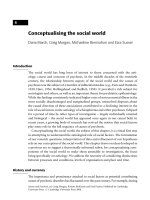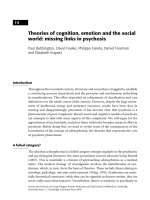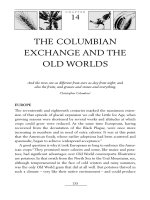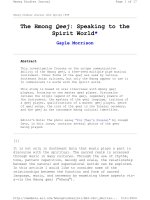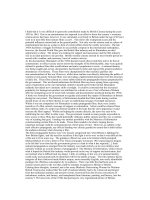THE MATERIAL WORLD
Bạn đang xem bản rút gọn của tài liệu. Xem và tải ngay bản đầy đủ của tài liệu tại đây (409.77 KB, 28 trang )
3
o
THE MATERIAL WORLD
A
sizable majority of the words that are added to our dic-
tionaries nowadays are names for things. People just
won’t stop inventing things, and perceiving old things in
new ways. And things need names: blogs, infinity pools, conflict dia
-
monds. A separate issue is commercial products, with their expen-
sively, extensively negotiated and marketed names. Standard
dictionaries exclude most product and brand names, but the pro
-
portion of “new” words that name things rises even higher if you
count pre-existing words and phrases that have been turned into
brands: Tiger (computer operating system), Magic Hat (beer), Juicy
Couture (sportswear), BlackBerry (portable communication device).
And yet fugitives—especially captured ones—that name
things are relatively rare. I don’t know why. Granted, the creators
73
WORD FUGITIVES
of word fugitives are self-selected. Are we especially otherworldly
and nonmaterialistic? Search me. Or maybe the explanation is that
things already have names. Consider aglets (the tiny plastic wrap
-
pers at the ends of shoelaces) and altocumulus undulatus (the clouds
in a herringbone sky) and chads (you remember: the little spots of
paper that fall off punch cards). There is scarcely a thing so small
or ethereal or insignificant or transient that someone somewhere
has not named it.
A few of those hitherto-unnamed rarities are on display here.
These are followed by fugitives that have to do with our behavior
in relation to things, and then by ones having to do with things’
behavior in relation to us. The chapter also contains a lexicon of
my favorite names for things that have been coined elsewhere.
“How about a word for an object that works only if one em-
ploys a trick known to its owner or frequent user, like jiggling
it, putting pressure on it, warming it, or blowing on it?”
—Evelin Sullivan, Redwood City, Calif.
Some people think of eponyms—in particular, the likes of fonzie,
fonzable, and fonzer, all intended to evoke “the Fonz,” Henry
Winkler’s character in the sitcom Happy Days, because of his abil
-
ity to get the jukebox to work by giving it a whack.
74
THE MATERIAL WORLD
Evelin Sullivan, who asked for help in finding this word fugi-
tive in the first place, wrote again to propose a coinage: jigglit. A
couple of people suggested fussgadget. Bob Israel, of Westford,
Mass., proposed computer, explaining, “I’ve never seen one that
didn’t require regular trickery to keep it going.” Several people
proposed wife, husband, or spouse.
Neologisms beginning with thingama- were popular—for in-
stance, thingamajiggler and thingamabobject. Ones beginning with
idio- were more popular still. Michael Mates, an officer at the U.S.
Consulate General in Karachi, Pakistan, submitted idiosynpractical.
Nifty word, but we were looking for a noun. Other people sug
-
gested idiosecretic, idiopathetic, idiosymatic, and—hooray, some
nouns!—idiosyncrathing and idiosyncontraption. Arun Shankar, of
York, Pa., was thinking along these lines too, but he thought a bit
more, well, idiosyncretically than most, to arrive at idiosynamajig.
“What is the accumulation of stuff that collects under your
car, behind the wheels, when driving in slush or snow? These
lumps are truly hideous-looking, being composed of frozen
snow, sand, salt, and road grime. They fall off in the driveway
or parking lot, and sit there looking like some repulsive
growth until they melt in the spring.”
—Duane Douglass, North Berwick, Maine
75
WORD FUGITIVES
Apparently, sooner or later just about everybody in the snowy
parts of our continent feels a need for this word. On a “Word
Fugitives” Web page, Michael Fischer, of Minneapolis, pointed
out that Sniglets designated such a thing a fenderberg. Dan Bloom
wrote: “Some years ago, I think this was a word sought from lis
-
teners by the gang at NPR’s All Things Considered. If memory
serves, the favored submission was snard.” I searched the ATC
archives but, alas, failed to turn up anything relevant. Elsewhere
on the Web, though, I discovered that some people use snard as an
acronym for “Situation Normal, Another Rotten Day” and that
others know Snard as the name of a computer “launcher pro
-
gram.”
The book Wanted Words, however, contains snards (submitted
by Charlie Kolompar, of Rexdale, Ontario) defined like this: “the
muddy ice clumps that form behind car wheels in the winter.”
And a posting by “2stroked” on F150 Online, “the web site for
owners and enthusiasts of the late model Ford F-150 and other
full size Ford truck models” (www.F150online.com), shows that
snard is used this way in the United States too: “First of all—for
all you southerners—a snard is a collection of snow, ice, salt, road
grime (and if you live in New Jersey—Jimmy Hoffa) that builds
up behind the wheel wells of your F-150 (or any other vehicle)
when you drive in snow.” The Web site Urbandictionary (www
.urbandictionary.com), a slang-oriented reference source that is
being continually written by its users, has an entry for snardlump
with the same meaning—minus Jimmy Hoffa. Family Words also
76
THE MATERIAL WORLD
mentions snard, though the subject comes up under the heading of
grice (a word that “combines the words grime and ice,” as the book’s
author, Paul Dickson, explains).
Michael Christian, of Michigan, sent Word Fugitives carna-
cle—nice. Carnacle, like snards, appears in Wanted Words, but it’s
defined as “the coattail, dress hem, or seat belt that hangs out the
door of moving vehicles.” If dictionary words can have more than
one meaning, I suppose there’s no reason captured fugitives can’t.
Carnacle works for our purpose too.
“The Irish term is witches’ knickers. But on this side of the At-
lantic we don’t seem to have a name for disposable plastic
bags caught in trees, flapping in the wind.”
—Brendan J. O’Byrne, Regina, Saskatchewan
This question earned Word Fugitives a scolding from Kathleen
Dotoli, of Long Branch, N.J., who wrote, “I do not believe witches’
knickers should be messed with, as it is a perfect description.” Lee
Buenaventura, of Wellesley, Mass., felt nearly the same way, but
she suggested giving the term a “tweak” to Americanize it: witches’
britches. Then again, reports of existing American terms arrived
from all over. People on both coasts and in between submitted ur
-
ban tumbleweed. R. Matthew Green, of West Kingston, R.I., said
77
WORD FUGITIVES
that in his state “bags caught in trees, flapping in the wind, are
called shoppers’ kites.” Sheilah Zimpel, of Raleigh, N.C., wrote,
“Here in the South we call that white trash.” Samuel Hoffman, of
Fort Wayne, Ind., wrote, “Plastic bags trapped in trees and along
fence lines are called bag hawks.”
The query also presented an unexpected opportunity for
score-settling among interstate rivals. Kristen Lummis, of Grand
Junction, Colo., wrote, “A plastic bag caught in a tree (or a
barbed-wire fence), flapping in the wind, is known as the state bird
of Wyoming.” And Richard R. Crowder, of Lynchburg, Va., pro
-
posed the term West Virginia state flag.
But surely a good descriptor should apply more broadly—
even outside the United States, especially since the fellow who re
-
quested the word in the first place is Canadian. Suggestions that
would be appropriate almost anywhere include totebirds (George
Campbell, of St. Paul, Minn.), retailed hawks (Daniel Scheub, of
Dixon, Ill.), trash kites (Linda Muhlhausen, of Tinton Falls, N.J.),
treecycled plastic ( Jonathan Stone, of Annapolis, Md.), Glad
®
rags
(John R. Ehrenfeld, of Lexington, Mass.), and detreetus (Christina
Lamb, of Southborough, Mass.).
Daniel Brown, of San Carlos, Calif., wrote, “I suggest fooliage,
since the bags come from morons careless with their trash.” Rob
Barendse, of Granville, N.Y., suggested plastoliage. Can you see it
coming? That’s right: fouliage, which was first submitted by
Michael Abrams, of Custer, Wash.
78
ANTIQUES OR NOVELTY ITEMS?
Ten of these are dictionary names (mostly archaic, rare, or
dialectal) for things, and ten are family words or recre
-
ational coinages. Which are which?
Aquabob:
an icicle
Beggars’ velvet:
downy particles that accumulate under furniture from
the negligence of housemaids
Benble:
any minor anomaly—sweater pills, for instance
Cinestate:
property left by a cineaste
Dunolly:
an improvised umbrella
Eaper:
any object without an obvious function, such as the kind of thing
one is likely to find at the bottom of a box at a rummage sale
Glackett:
the noisy ball inside a spray-paint can
Goosecruives:
a pair of wooden trousers worn by poultry-keepers in the
Middle Ages
A head
of thyme: term for the herb in quantity
Hibernacle:
a winter retreat, or the winter home of a hibernating animal
Kiddliwink:
a small shop where they retail the commodities of a village
store
Kikidoori:
a pearl-like growth occasionally uncovered during root-canal
surgery
Knackatory:
a place to buy knickknacks
Nodge:
the only one of its kind, or having no mate
Platyplus:
a mammal with webbed feet, a duck bill, and opposable
thumbs
Quodammodotative:
a thing that exists in a certain way
Scatches:
stilts worn in the early sixteenth to the nineteenth centuries
when walking in filthy places
Tegestology:
the collecting of beer mats
Tittynope:
a small quantity of anything left over
Zythepsary:
a brewhouse
_________
_________
THE OLD SORTED OUT FROM THE NEW
Herewith the dictionary words, their sources, the non-
dictionary words, and their coiners.
Aquabob
is defined as “an icicle” in
The Word Museum
; its source was
an 1838 dictionary of “provincialisms.”
Beggars’ velvet
as a forerunner of
dust bunnies
appears in
The Word Mu-
seum
and in the
OED
. Their sources are, respectively, an 1887 slang
dictionary and an 1855 dictionary of “archaic and provincial” words.
Benble
to mean a “minor anomaly” is a coinage reported to
Family Words
by Cate Pfeifer, of Milwaukee, Wis.
Cinestate
, property left by a cineaste, is a neologism appearing in the
non-dictionary
Not the Webster’s Dictionary
.
Dunolly
means “an improvised umbrella” in
The Deeper Meaning of Liff
.
Elsewhere it is the name of an Australian town that was once an im
-
portant gold-mining center.
Eaper
, an object without an obvious function, was reported to
Family
Words
by a KMOX listener, in St. Louis.
Glackett
, the noisy ball inside a spray-paint can, appears in
Sniglets
.
The
Deeper Meaning of Liff
gives a similar definition for
Millinocket
,
which is otherwise a town in Maine.
Goosecruives
are wooden trousers worn by poultry-keepers only in
The
Deeper Meaning of Liff
. Elsewhere,
Goosecruives
is the name of a vil-
lage in Aberdeenshire, Scotland.
A
head
of thyme, referring to the herb in quantity, was coined by Harry
Richardson, of Laurel, Md., for The Style Invitational.
Hibernacle
, a winter retreat, is given in
More Weird and Wonderful Words
and the
OED
.
Kiddliwink
, a small shop, appears in
The Word Museum
. The
OED
also
notes this definition, from an 1859 dictionary of slang, where the
word is spelled
kiddleliwink
. But
kiddleywink
is the word’s primary
spelling according to the
OED
, and its primary meaning is “an ale-
house, esp. in the West Country; a low or unlicensed public house.”
Kikidoori
, a pearl-like growth, appears in “A Volley of Words.”
Knackatory
, a place to buy knickknacks, appears in
More Weird and
Wonderful Words
and the
OED
.
Nodge
, having no mate, was coined for
Burgess Unabridged
. A few newer
near synonyms have to do specifically with socks. Two that are given
in
Family Words
are
Robinson Crewsock
, reported by Marlene
Aronow, of Deerfield, Ill.; and
lurkin
, “so called because you know the
mate is lurkin’ around somewhere,” according to C. W. Sande, of
Caldwell, Idaho.
Platyplus
, a name for an impressive imaginary mammal, was coined by
Russell Beland, of Springfield, Va., for The Style Invitational.
Quodammodotative
appears in the
OED
.
What
does it mean—or, inas-
much as it’s obsolete, what did it once mean? Thomas Stanley tried
to explain in the 1656 volume of his
History of Philosophy
. He wrote,
“Things are subdivided into foure Genus’s, Subjects, and Qualitatives
and Quodammodotatives in themselves, and Quodammodotatives as
to others.” Ah, yes. Of course.
Scatches
are indeed stilts that were worn when in filthy places, accord-
ing to
Forgotten English
and the
OED
.
Tegestology
, the collecting of beer mats, appears in
Weird and Wonder-
ful Words
and the
OED
.
Tittynope
, a small quantity of anything left over, appeared in an
1896–1905
English Dialect Dictionary
, according to
The Word Mu-
seum
.
Zythepsary
, for a brewhouse, appears in
An English Dictionary
(1713),
according to
The Word Museum
.
WORD FUGITIVES
“What is a word to describe the process of going through the
dirty-clothes hamper to find something clean enough to
wear?”
—Gail Jarocki, Richmond, Calif.
Evidently, the behavior in question is rampant in our land. At
least, an astonishing number of people who responded to this re
-
quest for a word admitted they drew on personal experience. Do
cultural anthropologists know about this? Do laundry-detergent
marketing executives?
“Too often in the morning I find myself frantically pawing
through the hamper, hoping that my mother-in-law won’t come
knocking at the door and catch me,” Nils Jonsson, of Sugar Land,
Texas, wrote. The term that Jonsson (among others) coined to de
-
scribe what he does is skivvy-dipping. “My husband snifferentiates
the foul shirts from the merely stale while getting dressed in the
morning,” Jara Kern, of New York City, wrote. Denise Mathew, of
Charlottesville, Va., confessed, “In my home this process occurs
weekly at least.” Taking a mind-over-matter approach, she calls
what she does brainwashing.
Here’s an optimist—Jessica Chaiken, of Washington, D.C.,
who wrote: “According to my current theory of laundry compost
-
82
THE MATERIAL WORLD
ing, the heat and pressure of the top layer of clothing will clean the
bottom layer. I’m still working on this theory. I’m sure there’s a
government grant out there somewhere!”
Here’s a realist—Noel Trout, of Los Angeles, who wrote: “My
wife, Cathy, and I have done our share of snifting while trying to
find something suitable in the dirty-clothes pile (we won’t even
claim our dirty clothes make it into a hamper).”
Here’s an intellectual—William Weaver, of New York City,
who wrote: “To call it a dirty-clothes hamper is to overstate the
case. For many of us, the hamper is like an overstock bin where
clothes go into a complex holding pattern, and a quick windventory
will often produce a perfectly respectable outfit.”
And here’s someone remembering a morning she’d probably
rather forget—Amy Herzberg, of Fayetteville, Ark. She wrote:
“Recently I rummaged through my laundry hamper to find some
-
thing to wear to an important meeting. In the kitchen I forced my
husband to sniff my armpits to ensure my secret would be safe. At
that exact moment our overnight guest appeared in the doorway.
We all froze. No one spoke. Then we sat down to breakfast as if
nothing had happened.” Herzberg’s term for what she was doing is
desperspirationalizing.
And here’s someone succinctly explaining an apt, droll
coinage—Jill Geisler, of Bayside, Wis. She wrote: “This process is
familiar to anyone who has or has been a teenager. I believe this
laundry alternative is known as dry gleaning.”
83

